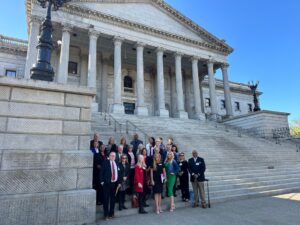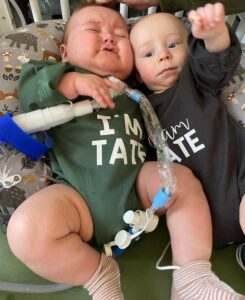Submitted by Dave Totaro, Chief Government Affairs Officer (GAO)
This is the most important “Call to Action” in BAYADA’s history. The US Senate in Washington is pushing through a bill that would drastically cut services and access to care by trying to vote on a bill without any hearings or any debate.
As Hearts for Home Care, you will undoubtedly be a driving force to preventing this potentially damaging action. In fact, more than 2,400 of our champions have already sent more than 120,000 letters to senators and our #NoHearingNoVote hashtag has been posted more than 700 times with a reach of 2 MILLION https://www.heartsforhomecare.com/wp-content/uploads/2022/11/Home-Care-Moms.jpgs on Twitter! Continue to have conversations with your colleagues and encourage advocacy. We have complete and total confidence that your efforts will be paramount to our success!
Take action three different ways!
- Email US Senators: If you haven’t already, please visit www.bayada.com/actnow to take action now. Note: You will be asked to enter your work e-mail and home zip code to take action.After you take action, forward the link to three friends and share it on your social media pages!
- Facebook profile frame: Use these instructions to add a #NoHearingNoVote frame to your profile picture.
- #NoHearingNoVote social media post: Post a photo of yourself, your fellow Hearts for Home Care, or your loved ones holding up a sign showing that we’re standing up for our clients and caregivers. When you share, be sure to include the hashtag #nohearingnovote in the caption.
Where are we now?
On Thursday, June 22, the Senate released the Better Care Reconciliation Act, a “discussion draft” of its version of the American Health Care Act. Four Republican senators have stated publicly they do not support the bill in its current form, meaning it cannot pass the Senate without changes being made to it. The Congressional Budget Office (CBO) is not expected to release a cost estimate of the legislation until early next week. A vote in the Senate could occur prior to the July 4 recess.
This version of the legislation would make broad changes to federal spending in these five areas:
- Medicaid: Reduces federal matching rate for adults covered by the Medicaid expansion; caps the growth in per-enrollee payments for most Medicaid beneficiaries
- Tax credits and related coverage provisions: Eliminates subsidies to purchase plans from the individual market in 2020; revises ACA tax credits
- Patient and state stability fund grants: Provides $112 billion to states and insurers to reduce premiums for insurance purchased in the individual market
- Penalty payments: Eliminates the employer mandate and individual mandate penalties
- Noncoverage provisions: Repeals multiple taxes not relating to coverage, including the tax on high-income people and the medical device tax








